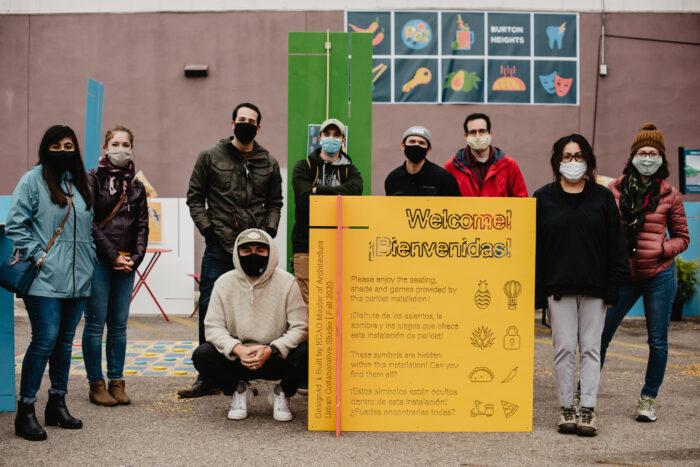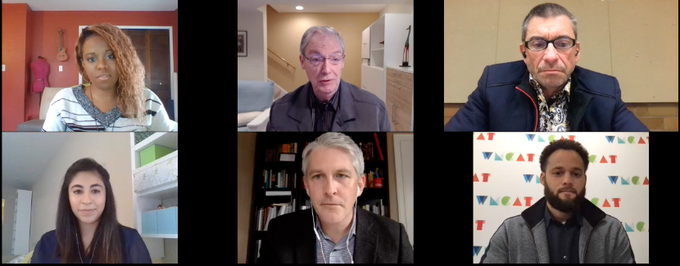


 While COVID-19 sharply limited the availability of traditional internships last summer, graduate architecture student Fatema Sulemanji turned it into an opportunity to gain valuable experience that would inform her perspective as a design professional. She completed a research internship, contributing to a book on housing affordability, in conjunction with the MAF + AIA Michigan Internship Bridge Program.
While COVID-19 sharply limited the availability of traditional internships last summer, graduate architecture student Fatema Sulemanji turned it into an opportunity to gain valuable experience that would inform her perspective as a design professional. She completed a research internship, contributing to a book on housing affordability, in conjunction with the MAF + AIA Michigan Internship Bridge Program.
The goal of the six-week MAF + AIA Michigan Internship Bridge Program was to help bridge the gap in available student architectural internships in Michigan due to COVID-19, and preserve educational, work experience, and career-boosting opportunities normally provided through the traditional internship experience.
Fatema, who is currently in the final year of her Master of Architecture program at Kendall College of Art and Design, originally approached Kendall professor and program chair, Dr. Michael McCulloch, to inquire whether he knew of any available internships with architectural firms. Instead, he offered Fatema an academic research role as an internship. Fatema helped support the conclusion of a book on housing affordability, called Building a Social Contract: Modern Work of Houses in Detroit, that Dr McCulloch was completing. The MAF + AIA Michigan Internship Bridge Program provided the program structure and funding for Fatema’s internship.
“I was intrigued by the opportunity to do thought-provoking research, especially with the activities last summer that put housing inequity in the spotlight,” said Fatema. “I wanted to help contribute to an important social issue, particularly with current events bringing a contemporary perspective to the book.”
 She continues, “My internship was a unique, one-on-one format that intertwined the academic with experience that would benefit me in my future career. While the work was all done virtually, I had regular calls and chats with Dr. McCulloch about the research. I appreciated that I could work safely and had the flexibility to set my own schedule. The only drawback was that COVID made visiting affordable housing sites, for added perspective, impossible.”
She continues, “My internship was a unique, one-on-one format that intertwined the academic with experience that would benefit me in my future career. While the work was all done virtually, I had regular calls and chats with Dr. McCulloch about the research. I appreciated that I could work safely and had the flexibility to set my own schedule. The only drawback was that COVID made visiting affordable housing sites, for added perspective, impossible.”
Fatema, who earned her Bachelor’s in Architecture from the University of Westminster, is no stranger to non-traditional internships: she previously interned at a construction management firm, Lendlease, in her native United Kingdom, where she visited project sites and learned about the construction process. Currently, she is completing an interior design internship at Steelcase, engaging her interest in the work between different design disciplines. This Spring, she will be part of another research project, working with Michigan State University’s Department of Domicology and the Detroit Land Bank Authority. “I’m excited about the project, and to be given the opportunity to share my perspectives on the built environment. The project looks at structural abandonment, material salvage and re-use, which are important issues to be addressed,” she says.
 How does Fatema think architecture enriches life? “The discipline of architecture is interrelated with many fields, including politics, the economy, and the environment, as well as the health and well-being of people. Late last year, I did a talk series with the West Michigan Center for Arts + Technology (WMCAT) titled “Urbanism for All,” looking at how architecture impacts communities, and how local changes can make a difference. As a student coming into the field, participating in these conversations helps you to understand how architecture impacts so much of life, and that it is important for all of us, as design professionals or otherwise, to be advocates for better.”
How does Fatema think architecture enriches life? “The discipline of architecture is interrelated with many fields, including politics, the economy, and the environment, as well as the health and well-being of people. Late last year, I did a talk series with the West Michigan Center for Arts + Technology (WMCAT) titled “Urbanism for All,” looking at how architecture impacts communities, and how local changes can make a difference. As a student coming into the field, participating in these conversations helps you to understand how architecture impacts so much of life, and that it is important for all of us, as design professionals or otherwise, to be advocates for better.”
Fatema is a featured content contributor for WMCAT. Read her bio on the WMCAT website.